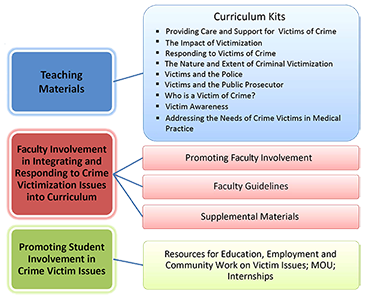The U.S. Department of Justice, Office for Victims of Crime (OVC), funded the University of Massachusetts Lowell, School of Criminology and Justice Studies, along with partners from the University of Massachusetts Boston, University of Massachusetts Dartmouth, and University of Massachusetts Medical School to develop innovative, multidisciplinary education models that address victimization issues and responses to crime victims.
The project is designed to broaden college and university students' awareness of crime victims' issues and knowledge of appropriate responses, and to increase the number and diversity of students exposed to and educated in crime victims' issues. The approach is based on the premise that by adding a victim issues component to existing courses and programs, developing new victim-oriented courses and programs, and increasing the availability of victim-oriented field placements, victim issues will obtain a new level of prominence in university and college curricula.
The curricula material was developed using rigorous standards—material was developed by educators from the criminal justice and medical fields for educators; material was pilot tested with college students to ensure that it was effective; and the final material was peer reviewed by education leaders in criminal justice.
The materials that have been developed and tested are designed for:
Faculty. College and university faculty teach about these issues and, even when a course is not directly about a crime victim issue, victimization issues come up in class and can impact student work. These materials enable faculty from diverse disciplines to educate themselves more fully about crime victims' issues and about responding appropriately to victims. These materials can also assist with adding victim issues components to existing courses and programs, developing new victim-oriented courses and programs, and increasing the availability of victim-oriented field placements.
Victim advocates. Victim advocates, State Victim Assistance Academy members, and all professionals who work with victims may find the materials useful when they teach classes. They may also want to share them with faculty to promote appropriate and sensitive faculty responses to students who are crime victims, and to advocate to faculty that their colleges and universities adopt them for their coursework in order to better prepare students for future careers and for taking a role in society that is sensitive to crime victim issues.
The materials are designed to be easily customized for faculty and victim advocates needs.
Curriculum Kits/Teaching Materials: Course materials on a variety of topics, including reading lists, slides, class exercises, and sample assignments, and electronic and media presentations.
Faculty Involvement: Steps to take to create a supportive learning environment for students, handle disclosures, and provide appropriate support and referrals.
Promoting Student Involvement: Templates designed to be used for student placements that focus on victim issues.

A website from the White House Task Force to Protect Students from Sexual Assault that offers useful information for students, school administrators, faculty, and anyone interested in obtaining resources on how to respond to and prevent sexual assault on college and university campuses.







